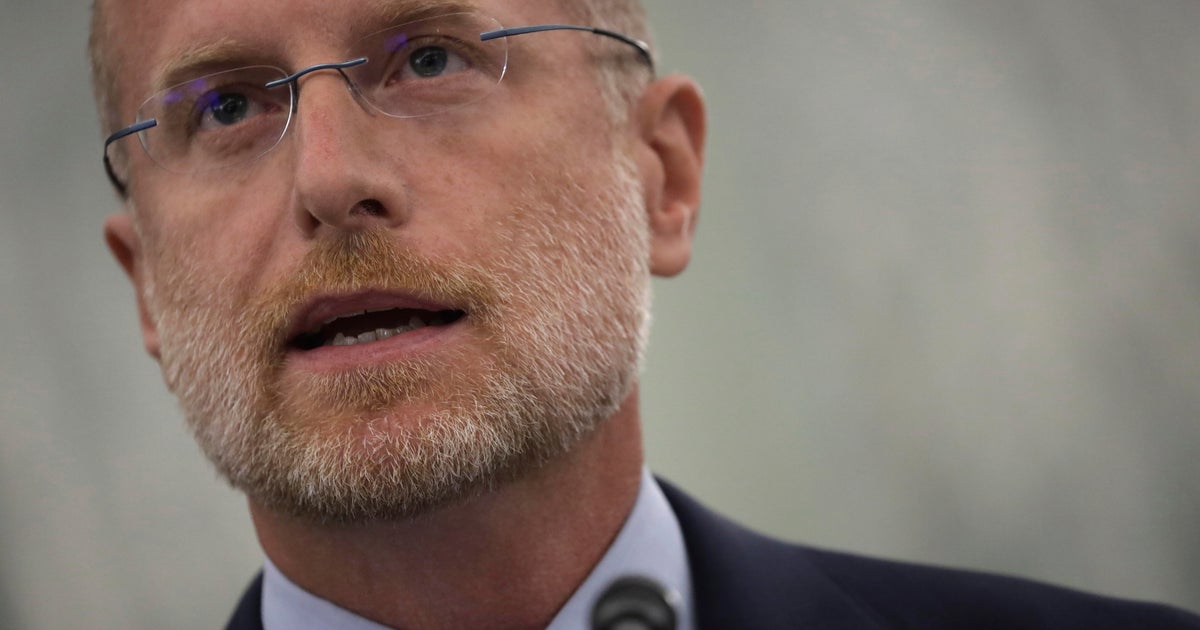CBS News
Charges dropped against Tyron McAlpin, deaf Black man with cerebral palsy whose Phoenix arrest video prompted outrage

The top prosecutor in Arizona’s Maricopa County announced Thursday that charges against Tyron McAlpin — a Black man who is deaf and has cerebral palsy, and who was seen on video being violently arrested — are being dropped.
The announcement comes after police body camera video of McAlpin’s arrest, which showed two Phoenix police officers repeatedly punching and tasing McAlpin, became public and sparked outcry.
“I have now completed my review and have made the decision to dismiss all remaining charges against Mr. McAlpin,” Maricopa County Attorney Rachel Mitchell said Thursday.
McAlpin had been facing three felony charges for allegedly assaulting the two arresting officers and resisting arrest.
Phoenix police officers had been called because a White man was loitering at a convenience store on Aug. 19. That man claimed he had been assaulted and that his phone had been stolen, and he pointed to McAlpin as the culprit. McAlpin was not charged for the incident involving that man and his lawyer says he was wrongfully accused.
In the arrest video, officer Benjamin Harris was seen jumping out of his vehicle and punching McAlpin as officer Kyle Sue rushed over. McAlpin was punched at least 10 times and was also tased repeatedly. Sue can be heard on the video claiming McAlpin bit him and, in the police report from the incident, Harris claimed McAlpin swung at him.
“Tyron is just trying to avoid getting hurt by an aggressive, out-of-control police officer,” McAlpin’s attorney, Jesse Showalter, previously told CBS News. “He can’t hear any of the commands he’s being given and the assault never lets up and the officers never do anything to de-escalate the situation.”
The arrest video prompted strong reactions from the NAACP and ACLU, prompting Mitchell to announce she would “personally review the entire file, as well as the totality of the video.”
She also noted Thursday that she had “convened a large gathering of senior attorneys and members of the community to hear their opinions as they pertain to this case” earlier in the week.
The arrest of McAlpin came two months after a scathing report from the Department of Justice found Phoenix police have engaged in a pattern of discrimination and excessive force.
contributed to this report.
CBS News
Trump’s FCC pick, Brendan Carr, wrote Project 2025’s chapter on the agency. Here’s what he wants.

President-elect Donald Trump’s pick to run the Federal Communications Commission, Brendan Carr, will oversee the agency that regulates U.S. internet access and communications networks such as TV and radio. Carr believes it’s an institution ripe for change, according to the nominee’s Project 2025 chapter on the agency FCC.
Carr will be stepping into the role of FCC Chair after serving as one of its five commissioners since 2017, when Trump nominated him to the role during his first administration. Prior to that, Carr served as the agency’s general counsel.
The FCC may not be a household name to most Americans, but the agency enforces communications laws, runs programs to help communities gain access to high-speed internet and regulates communications services, including satellite internet access, among other tasks. But under Carr, the agency may pivot to some new priorities during Trump’s next term, with a renewed focus on battling big technology companies and Chinese-based telecom firms.
“The FCC needs to change course and bring new urgency to achieving four main goals,” including “reining in Big Tech,” Carr wrote in his chapter on the FCC in Project 2025.
Here’s what to know about Carr’s priorities.
How might the FCC deal with tech giants?
In Project 2025, Carr highlighted what he believes is a need for a new approach to dealing with tech giants such as Google, Meta and others.
“Today, a handful of corporations can shape everything from the information we consume to the places we shop,” Carr wrote in the document. “These corporate behemoths are not merely exercising market power, they are abusing dominant positions.”
The FCC should restrict immunity from Section 230, part of a law that says tech companies aren’t liable if a user posts something libelous, as well as tamp down the businesses’ ability to “censor protected speech while maintaining their Section 230 protections,” he wrote.
Carr also wants tech companies to be more transparent about their algorithm changes and their decisions to block or demonetize users.
What are Carr’s views on Elon Musk?
Carr has built an alliance with billionaire Musk, the world’s wealthiest person who backed Trump’s campaign and whose Starlink satellite internet service could benefit from access to federal cash.
In a Tuesday interview with Fox News, Carr pointed to Musk as an example of how the federal government doesn’t treat people fairly, noting that a grant of almost $900 million to Musk’s Starlink was “revoked unlawfully.” Last year, the FCC said it rejected the grant because of lack of proof that Starlink would be able to provide service to hundreds of thousands of rural properties.
“It is time for the American government to not give people different treatment based on their last name,” Carr told Fox News. “Everybody will get a fair shake from the government going forward.”
What about his views on TikTok and Chinese businesses?
In his Project 2025 chapter, Carr singled out TikTok and other Chinese-owned businesses as potential threats to U.S. security.
“As law enforcement officials have made clear, TikTok poses a serious and unacceptable risk to America’s national security,” Carr wrote. “It also provides Beijing with an opportunity to run a foreign influence campaign by determining the news and information that the app feeds to millions of Americans.”
That would align his views along those with the Biden administration, with the president signing a law in April that would require TikTok to be sold or else banned from the U.S.
Carr also wrote that he believes the FCC needs to do more to monitor and restrict Chinese telecom and tech businesses from operating within the U.S.
What does Carr say about broadcasters?
Carr has taken aim at some broadcasters, including CBS News, echoing Trump’s claims that they engage in political bias. For instance, Carr singled out NBC for including Trump’s Democratic rival, Kamala Harris, in a “Saturday Night Live” skit before the election.
“This is a clear and blatant effort to evade the FCC’s Equal Time rule,” Carr wrote on X on November 2. “The purpose of the rule is to avoid exactly this type of biased and partisan conduct — a licensed broadcaster using the public airwaves to exert its influence for one candidate on the eve of an election.”
After Trump announced Carr’s pick, Carr said on X that he will ensure the FCC “will enforce” laws that call on broadcasters “to operate in the public interest.”
Trump has repeatedly called to strip major broadcasters such as ABC, NBC and CBS of their licenses. During the 2024 campaign, Trump sued CBS News over a “60 Minutes” interview with Harris, alleging the network used “deceitful” editing of her responses. CBS News has called the president-elect’s claims “completely without merit” and added it intended to vigorously defend against the lawsuit.
What do supporters and critics say about Carr?
Trump praised Carr as “a warrior for Free Speech” in a statement announcing his selection. Fellow FCC Commissioner Geoffrey Starks, a Democrat, described Carr as “a dedicated public servant and a recognized leader on the many issues before the Commission today.”
But some critics have flagged some of Carr’s stances, with the nonpartisan public interest group Free Press describing his relationship with Musk as well as his stance on broadcasters as problematic.
“While styling himself as a free-speech champion, Carr refused to stand up when Trump threatened to take away the broadcast licenses of TV stations for daring to fact check him during the campaign,” Free Press Action Co-CEO Craig Aaron said in a statement. “This alone should be disqualifying.”
Free Press and Fight for the Future, an advocacy group focused on digital rights, both have cited concerns about net neutrality, a policy that ensures internet service providers treat all websites and online content equally. Net neutrality was overturned during the first Trump administration, but was restored during Biden’s term.
“Trump’s nomination of Brendan Carr, one of the co-authors of Project 2025, to head the FCC is more than just a reversal of popular policies like net neutrality,” said Evan Greer, director of Fight for the Future, said in an email. “Carr has made clear he actually wants the FCC to get more involved in policing online speech.”
CBS News
H&R Block and Intuit drop on a report that Elon Musk’s DOGE may develop a new tax-filing app

H&R Block and Intuit shares dropped on Tuesday after the Washington Post reported that President-elect Donald Trump’s Department of Government Efficiency, which is run by billionaires Elon Musk and Vivek Ramaswamy, is looking at developing a free app for people to file their taxes.
The publication cited two people, who spoke on the condition of anonymity, in reporting that the leaders of the incoming administration’s DOGE discussed the idea of crafting a mobile app to file income tax returns with the Internal Revenue Service.
H&R Block shares tumbled 8.2%, while Intuit shed 5.1% on Tuesday. As the dominant players in tax preparation, H&R Block and Intuit, the maker of TurboTax, generate billions in revenue annually by offering online and in-person services.
The Biden Administration in March rolled out a pilot Direct File program through the IRS in 12 states. It allows qualified taxpayers file directly through a federal portal. Additionally, the IRS provides services through its Free File program for those who made an adjusted gross income of $79,000 or less.
More than 100,000 taxpayers used the new Direct File program to file their taxes this year, which marked the first time the system was in operation, according to the Treasury Department.
The DOGE, which has been directed by Trump to slash government spending and cut federal regulations, criticized the complexity of the U.S tax code in a Nov. 16 post on X, the social media service owned by Musk.
“In 1955, there were less than 1.5 million words in the U.S. Tax Code. Today, there are more than 16 million words,” its X account wrote. “Because of this complexity, Americans collectively spend 6.5 billion hours preparing and filing their taxes each year.”
Intuit and H&R Block also have free filing options.
That said, the Federal Trade Commission earlier in the year barred Intuit from advertising its popular TurboTax product as free when most people have to pay to use it. The FTC in February filed an administrative complaint against H&R Block, alleging it marketed its tax-prep products as free yet deleted the data as a way to pressure them to pay for pricier services. Both companies said they’d appeal.
CBS News
Trump “hush money” sentencing could hang in limbo for years

Watch CBS News
Be the first to know
Get browser notifications for breaking news, live events, and exclusive reporting.








